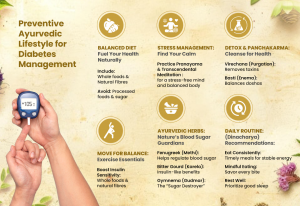World Diabetes Day: Ayurvedic Tips for Diabetes Prevention and Management
Did you know that India is becoming the diabetes capital of the world? Known as Madhumeha in Ayurveda, diabetes has become one of the most urgent health challenges, especially in India. This World Diabetes Day, let’s raise awareness about diabetes—its root causes, the post-COVID rise in cases, and the preventive lifestyle changes that Ayurveda recommends for balanced health.
Diabetes often stems from an imbalance in the body’s metabolism, exacerbated by modern sedentary lifestyles, processed diets, and high-stress levels. In Ayurveda, diabetes results from an imbalance in the Kapha and Pitta doshas, which disrupts the body’s natural insulin function. These doshas impact energy flow and digestive processes, which, when disturbed, lead to metabolic issues like diabetes. This doshic imbalance is often worsened by Ama (toxins) from poor digestion, further impairing the body’s natural blood sugar regulation.

With over 77 million cases, India has become a significant hub for diabetes, largely due to rapid urbanisation and lifestyle shifts. High-calorie diets, reduced physical activity, and genetic predispositions have contributed to this surge, making type 1 diabetes and type 2 diabetes common occurrences. Adding to this challenge, the COVID-19 pandemic has significantly worsened diabetes rates. During lockdowns, limited movement, increased stress, and the lingering effects of COVID-19 weakened immune systems, complicating diabetes management and elevating average blood sugar levels across all age groups.
Adopting a proactive lifestyle remains one of the best defences against diabetes. A balanced diet, daily exercise, and stress management are powerful tools for maintaining healthy blood sugar levels. Ayurveda recommends focusing on whole foods and natural fibres while reducing sugar and processed foods to prevent blood sugar spikes. Regular yoga, brisk walking, or light jogging can improve insulin sensitivity and support healthy glucose levels. Stress management is crucial, as high stress can raise blood sugar; hence, incorporating Pranayama and meditation can greatly support mental and physical health.
For those at risk or already managing diabetes, Ayurveda offers natural remedies to support stable blood glucose. Herbs like Methi (fenugreek), Karela (bitter gourd), and Gudmar (Gymnema) are known for their ability to help control blood sugar. Fenugreek seeds, for example, are rich in soluble fibre, which slows carbohydrate absorption, helping regulate blood sugar levels after eating. Bitter gourd has insulin-like properties, and gymnema is often called the “sugar destroyer” because it reduces sugar absorption. Ayurvedic Vaidyas also recommend following Dinacharya (daily routine), which involves consistent meal times, mindful eating, and good sleep habits for balanced glucose levels.
For those seeking a deeper reset, Panchakarma offers detoxifying treatments to aid diabetes management by removing toxins and balancing the doshas. Therapies like Virechana (therapeutic purgation) and Basti (medicated enema) aim to remove toxins from the body and balance the doshas. These treatments can help reduce complications and improve the body’s metabolic response. Maharishi Ayurveda Hospital, known as the best Panchakarma centre in Delhi, provides structured therapies under expert guidance, helping patients achieve greater metabolic stability.
As diabetes affects more lives, adopting Ayurvedic practices can pave the path to both prevention and long-term diabetes management. This World Diabetes Day, let us take small steps towards balanced living, aligning our lifestyles with ancient wisdom to keep diabetes at bay.
For the best Ayurvedic treatment in Delhi, visit Maharishi Ayurveda Hospital, home to some of Delhi’s best Ayurvedic doctors for diabetes management and holistic care.


